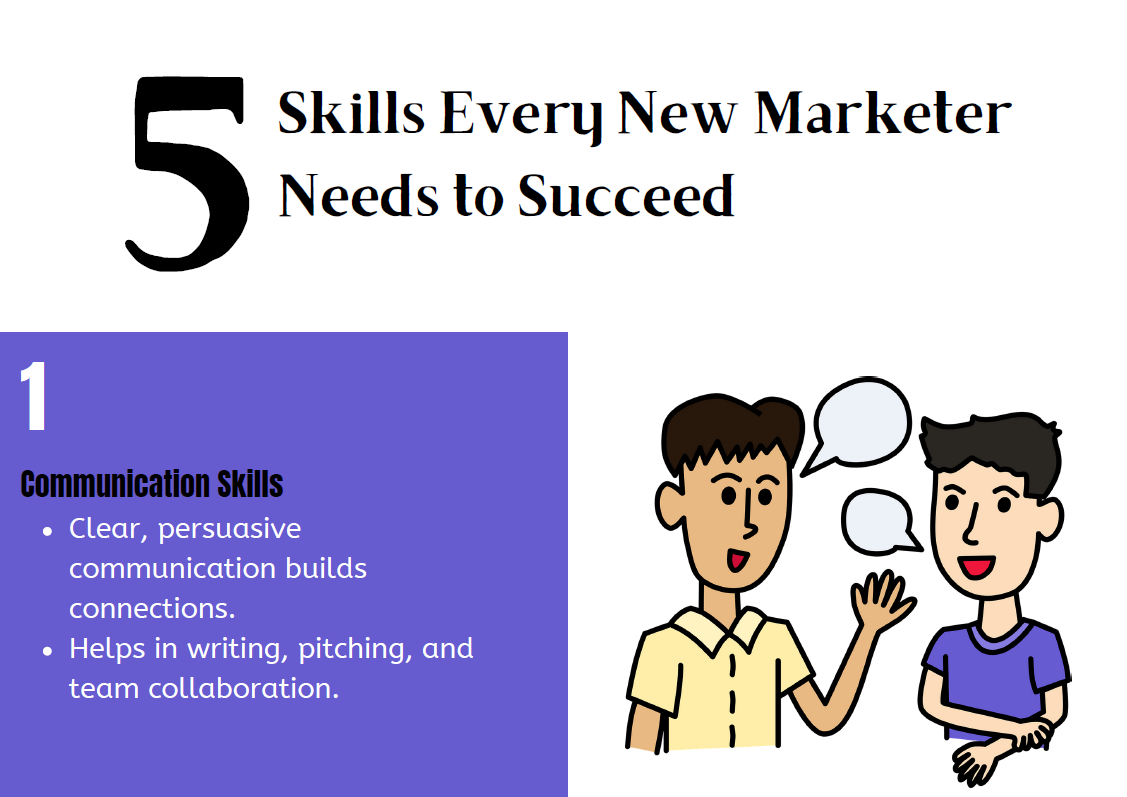Marketing is more than just strategies, tools, and platforms. It’s about connecting with people and delivering results in a fast-paced, ever-changing environment. While technical skills are critical, soft skills play an equally important role in helping marketers thrive. Mastering these skills will set you apart and empower you to excel in any marketing role.
In this article, we’ll explore five key skills every new marketer should focus on and why they’re essential for career success.
1. Communication: The Foundation of Marketing Success
Why It Matters:
Clear, concise, and persuasive communication is the backbone of effective marketing. Whether you’re writing a blog post, developing a social media campaign, or pitching an idea to stakeholders, the ability to convey your message clearly can make or break a campaign. Great communication allows you to build relationships, understand your audience, and ensure everyone—clients, teams, or customers—are on the same page.
How to Master It:
- Practice active listening: Listen carefully to your audience and colleagues to understand their needs and perspectives before responding.
- Keep it simple: Avoid jargon when explaining complex ideas and focus on clarity.
- Hone your storytelling skills: Stories are one of the most persuasive tools in marketing. Practice crafting messages that resonate emotionally with your audience.
2. Data Analysis: Making Informed Decisions
Why It Matters:
Data-driven marketing is essential for optimizing campaigns and ensuring you’re making the right decisions based on facts, not just intuition. Understanding data helps you identify what works, what doesn’t, and where opportunities lie. Whether it’s analyzing website traffic, conversion rates, or engagement metrics, interpreting data allows you to refine your strategies and improve performance.
How to Master It:
- Learn key metrics: Familiarize yourself with critical marketing KPIs such as CTR (Click-Through Rate), CPA (Cost Per Acquisition), and ROI (Return on Investment).
- Use data visualization tools: Tools like Google Analytics, Excel, and Tableau can help you better analyze and present data insights.
- Take action on insights: Data is only valuable if you use it to make improvements. Regularly review campaign data and adjust your approach based on findings.
3. Creativity and Innovation: Standing Out in a Crowded Market
Why It Matters:
In a world where consumers are constantly bombarded with information, creativity is what helps brands stand out. Whether you’re brainstorming a new campaign or designing a social media post, thinking outside the box can make your marketing more memorable and impactful. Innovation pushes you to find fresh ways to engage your audience, solve problems, and stay ahead of competitors.
How to Master It:
- Think beyond the obvious: Challenge conventional thinking by exploring new ideas and asking “what if?” during brainstorming sessions.
- Collaborate with diverse teams: Engaging with different perspectives can spark creative solutions you may not have considered on your own.
- Stay inspired: Follow trends in design, technology, and pop culture. Draw inspiration from unexpected sources, such as art, music, and history.
4. Project Management: Keeping Campaigns on Track
Why It Matters:
Marketing campaigns often involve multiple moving parts, from creative design to content development to analytics. Without strong project management skills, it’s easy for deadlines to slip and budgets to spiral out of control. Being able to organize, plan, and manage a campaign from start to finish ensures that everything runs smoothly and achieves the desired results.
How to Master It:
- Use project management tools: Tools like Trello, Asana, and Monday.com can help you track tasks, deadlines, and team responsibilities.
- Prioritize tasks: Learn how to identify the most critical tasks that move a project forward and focus on those first.
- Communicate effectively: Keep all stakeholders updated on progress and potential roadblocks, and maintain transparency throughout the project.
5. Adaptability: Thriving in a Rapidly Changing Industry
Why It Matters:
The marketing landscape is constantly evolving, with new tools, trends, and consumer behaviors emerging all the time. Marketers who can stay flexible and quickly adapt to these changes will thrive, while those who stick rigidly to old ways of thinking may struggle. Being adaptable also means staying open to learning new skills and embracing experimentation in your campaigns.
How to Master It:
- Stay updated on industry trends: Follow marketing blogs, attend webinars, and read industry reports to stay informed about the latest changes.
- Embrace change: Rather than resisting new tools or strategies, approach them as opportunities to learn and grow.
- Experiment: Try new tactics or platforms without fear of failure. Learning what doesn’t work can be just as valuable as finding what does.
Success in marketing isn’t just about knowing the latest tools and strategies—it’s about mastering the essential skills that help you communicate effectively, analyze data, think creatively, manage projects efficiently, and adapt to an ever-changing landscape. These skills will enable you to thrive not only in your current marketing role but also in the long term as you grow in your career.
By focusing on developing these skills early on, you’ll set a strong foundation that will help you stand out as a marketer and achieve lasting success in the industry.

Send download link to:
